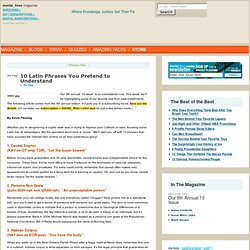

Handy Latin Phrases. 10 Latin Phrases You Pretend to Understand. Our 8th annual ‘10 Issue’ is on newsstands now.

This week, we’ll be highlighting some of our favorite lists from past installments. The following article comes from the 4th annual edition. If it puts you in a subscribing mood, here are the details. (Or consider our subscription + mental_floss t-shirt deal for just a few dollars more.) By Kevin Fleming Whether you’re deciphering a cryptic state seal or trying to impress your Catholic in-laws, knowing some Latin has its advantages. 1. Before money-back guarantees and 20-year warranties, caveat emptor was indispensable advice for the consumer. 2. Remember your old college buddy, the one everybody called Chugger? 3. When you wake up in the New Orleans Parish Prison after a foggy night at Mardi Gras, remember this one. 4. When all those spirited mental wrestling matches you have about existentialism start growing old (yeah, right!)
Fun With Words: Collective Nouns. How 'OK' took over the world. 18 February 2011Last updated at 10:49 OK is everywhere, used every day It crops up in our speech dozens of times every day, although it apparently means little.

So how did the word "OK" conquer the world, asks Allan Metcalf. "OK" is one of the most frequently used and recognised words in the world. It is also one of the oddest expressions ever invented. It's odd-looking. We generally spell it OK - the spelling okay is relatively recent, and still relatively rare - and we pronounce it not "ock" but by sounding the names of the letters O and K.
Visually, OK pairs the completely round O with the completely straight lines of K. Continue reading the main story International OKs Native American Choctaw: Okeh - it is so Scottish: Och aye - oh yes Greek: Ola kala - all is right German: ohne Korrektur - without [need for] correction Finnish: Oikea - correct Mandinka: O ke - that's it Almost every language has an O vowel, a K consonant, and an A vowel. But there was still only restricted use of OK. 100 Most beautiful words in the English language*
These are the grammar, usage, and style errors seen most commonly in written materials. Alan Kennedy's Color/Language Project - The Idiom List. Section I - Useful Phrases. Start writing fiction - Audio - Download free content from The Open University. Learn Your Damn Homophones. Learn the phonetic alphabet.
By stretch | Thursday, December 31, 2009 at 3:18 a.m.

UTC How often have you been on one end of a telephone conversation that went like this? A: "Okay, give me the MAC address. " B: "Zero zero, zero two, six bee--" A: "Six what? " B: "Bee. " ...and so on. The phonetic alphabet is a mapping of individual letters and numbers to specially chosen words which are unlikely to be mistaken for one another (for instance, none of the words in the phonetic alphabet rhyme). About the Author Jeremy Stretch is a network engineer living in the Raleigh-Durham, North Carolina area.
Comments Dedan (guest) December 31, 2009 at 3:28 a.m. I find this usually identifies the person I am talking to as a veteran. CiscomonkeyDecember 31, 2009 at 3:45 a.m. I do this by habit (former military here). Haakon (guest) December 31, 2009 at 3:58 a.m. Using the NATO phonetic alphabet saved me so much frustration when doing first level helpdesk. World Wide Words. Mental_floss Blog » Debunking Grammar Myths. This week we're joined by a special guest blogger. Patricia T. O'Conner, a former editor at The New York Times Book Review, is the author of the national best-seller Woe Is I: The Grammarphobe's Guide to Better English in Plain English, as well as other books about language. She is a regular monthly guest on public radio station WNYC in New York. Learn more at her website, grammarphobia.com. Make her feel welcome! When I think about the rules of grammar I sometimes recall the story—and it's a true one—about a lecture given in the 1950s by an eminent British philosopher of language.
Don't we all sometimes feel like that voice from the back of the room? English is not so much a human invention as it is a force of nature, one that endures and flourishes despite our best attempts to ruin it. So when you think about the rules of grammar, try to think like that guy in the back of the room, and never be afraid to challenge what seems silly or useless. May/June 2010 > Features > Cognitive Scientist Lera Boroditsky. Can language shape how we think? A Stanford researcher says yes, and her work speaks volumes about what makes people tick.
Language Appears to Shape Our Implicit Preferences. 50 Problem Words and Phrases. Table of Contents.